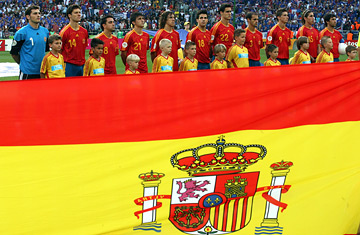
Victory is always glorious, but it has a singular sting for Spanish athletes who stand up to receive their gold medals and championship trophies: their national anthem has no lyrics. “For years we’ve been hearing from athletes that they feel a little lame up there on the podium,” says Alejandro Blanco, president of Spain’s Olympics Committee. “All they can do is sing along with ‘la la la.’” In an attempt to rectify the situation, the Committee, working with the Society of Authors and Writers, has opened a contest to put words to the Spanish national anthem. The winning entry will be presented before Parliament on Dec. 19, in the hope that the legislators will decide to make it official. But in today’s Spain, with its fierce regional identities and sharply conflicting political ideologies, the idea that members of the contest’s jury — let alone a bunch of politicians — could agree on a single set of lyrics seems a bit, well, quixotic.
It’s not the first time that someone has tried to put words to Spain’s Marcha Real, a military composition that dates to the 18th century. During the Franco regime, schoolchildren learned a version with lyrics by the anti-republican poet José María Péman, but the words were never officially approved, and they quickly fell out of favor once the dictator was dead. Prime Minister José María Aznar convened a committee of experts during his second term in office (2000-2004) to devise suitably patriotic lyrics, but committee member Jon Jauristi says it couldn’t reach an agreement. Even without lyrics, the anthem has been a recent object of contention between the conservative Popular Party (PP), which has taken to playing it at demonstrations against government policies, and the ruling Socialists, who accuse the opposition of attempting to “appropriate” the symbols of the state. With its pro-Spanish-unity stance, the PP has been noticeably more vocal than other parties in expressing its support for new lyrics.
Indeed, the biggest hurdle may be convincing autonomy-minded Catalans and Basques that they need a Spanish anthem at all, let alone a new and improved one. “Spain is a country of diverse cultures and languages,” says Julian Casanova, professor of Spanish history at the University of Zaragoza. “Whenever one person takes out a flag, someone else brings out a different one. It’s the same with national anthems.” Casanova suspects that political interests, more than sporting ones, lie behind the effort to pin words to melodies. “Whether it’s the national anthem, or the PP’s efforts to get everyone to display the flag, it’s manipulation,” he says, referring to the recent call by PP leader Mariano Rajoy for Spaniards to display the Spanish flag on October 12, a national holiday which commemorates the Spanish discovery and conquest of the Americas with military parades. “They’re using nationalism to upset the agreements that have made Spain a pluralistic country.”
The Olympic Committee, however, takes a more benign view. “No song is going to win over everyone,” Blanco admits. “But sports bring people together.” So far, over 5000 entries have been received — proof, he says, that “Spaniards have really taken to this idea.” After the deadline for submissions closes on October 26, a jury of specialists will convene in November to decide the winner. “It’s possible we could be hearing them sung in Beijing,” says Blanco.
María Vasco, who took the bronze in race-walking at the 2000 Olympics and another at the world championships in Osaka this year, hopes the plan is successful. She’s never won gold at an international competition, and thus has never had to hum from the podium, but she can imagine how awkward it feels. “I’m Catalan, but I’d have no problem singing a Spanish national anthem,” she says. “That would be phenomenal.”